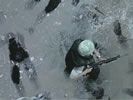Eye For Film >> Movies >> R-Point (2004) Film Review
"We're dying - do you copy?"
So asks the eerie disembodied voice, intercepted on military radio in Kong-su Chang's R-Point (aka Arpointeu) - and the last word of that message, in all its ambiguity, points to a principle of imitation and replication that is central to the film. For not only is R-Point concerned with the way that the same horrific brutalities replay themselves in different wars, but it also unashamedly parades its own copying of previous films, from the search-and-destroy of Apocalypse Now to the nervy psychedelia of Jacob's Ladder, from the bestial camaraderie of Full Metal Jacket to the spooky claustrophobia of The Shining.

Vietnam, 1972. Six months after a Korean scouting mission disappeared in a sacred and strategically important region known as R-Point, faint distress signals are picked up on the radio and, although the only soldier to return, blind and crippled, insists that he saw all the others die, Lieutenant Choi Tae-in (Kam Woo-sung), himself the sole survivor of a vicious battle, is assigned to lead a small platoon to the area and recover the missing men, dead or alive. Yet after chancing upon a cursed grave, some hostile fire, a squadron of American GIs, a Vietnamese woman in white and a transmission from a Frenchman, Choi and his men begin to realise that at R-Point, it is not easy to distinguish the living and the dead.
Co-writer/director Kong Su-chang is best known for the Vietnam film White Badge (1992) and the J-horror re-imagining Ring Virus (1999) - and in R-Point, he effectively combines these two genres. It turns out to be a sort of Bermuda Triangle, where two centuries' worth of Indo Chinese military atrocities loop back upon anyone with blood on their hands and where disorienting shifts in identity and chronology recreate something of what it is like to be lost, trapped and alone in a jungle full of unseen terrors.
Make no mistake about it: R-Point is one confusing trip - but never without purpose. The lack of properly individuated characters in Choi's platoon turns out to be not so much a failure of writing (even if it still grates), but rather of a deliberately unnerving strategy to blind soldiers and viewers alike to a (possible) infiltration by impostors.
The film climaxes with a bloody standoff, but parallel allusions to The Thing and Jacob's Ladder leave it unclear whether the men are possessed by something in the room, or by something entirely in their minds. The end is uncannily similar to its beginning to form a circle of the most mind-bendingly vicious kind.
It is anyone's guess whether this is a genuine haunting, or a case of group psychosis amongst terrified, combat-fatigued soldiers, but either way, R-Point serves as a thoroughgoing allegory of the fears, suicides, inhumanity, rage and murder doomed to repeat themselves in any and every conflict, and to haunt generations to come. It is a stark message ("We're dying - do you copy?") for a South Korean populace whose forces have recently been drawn once again - this time in Iraq - into a US-led military escapade of dubious moral validity.
In R-Point, you see, war - all war - really is hell.
Reviewed on: 17 Sep 2005





















